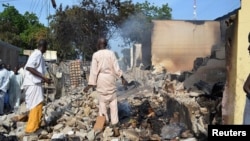GENEVA, SWITZERLAND —
The United Nations refugee agency is warning countries against forcibly returning people to northeastern Nigeria, where the escalating violence could put their lives at risk. The UNHCR reports some 10,000 Nigerians have fled into neighboring Cameroon, Chad and Niger in recent months.
The U.N. refugee agency says more than 8,000 of the Nigerians who have fled the escalating violence in their country have sought refuge in Cameroon.
Spokesman Dan McNorton said the UNHCR is alarmed at reports that local officials attempted to forcibly return 111 people from Cameroon to Nigeria on October 5.
“They were expelled from a village in the Far North region of Cameroon, to Adamawa state in Nigeria. During this incident, 15 people were killed and another seven wounded," said McNorton. "The remaining 89 individuals immediately fled back to Cameroon and were detained. UNHCR is working closely with the government of Cameroon to assess whether there are people in this group in need of international protection.”
Five months ago, Nigerian President Goodluck Jonathan declared a state of emergency in the states of Adamawa, Borno and Yobe after a surge of deadly attacks blamed on the Islamist radical group Boko Haram. The president dispatched more troops to the area, but the militants remain active and violence continues.
The UNHCR says the violence is estimated to have displaced about 5,000 people within the northeastern region of Nigeria, but the number actually could be significantly higher.
Spokesman McNorton said it is difficult to know the extent of displacement because the present dangers prevent his and other humanitarian agencies from accessing that area.
“It is very, very difficult in that part of Nigeria and we are trying to do what we can to see what access we can. But, obviously, the safety of our staff and others who we work with is of paramount concern," he said. "I think there are a number of factors, which, of course are interlinked in this region. We, and today with this return advisory, are underlying the importance of bordering countries, but also all states to ensure that their borders are kept open, and those fleeing conflict are given the safety and security that they need.”
McNorton said the terrible security situation prevailing in northeastern Nigeria indicates that people fleeing to other countries are likely to be genuine refugees as defined in the 1951 Refugee Convention and the Organization of African Unity Convention.
The U.N. refugee agency says more than 8,000 of the Nigerians who have fled the escalating violence in their country have sought refuge in Cameroon.
Spokesman Dan McNorton said the UNHCR is alarmed at reports that local officials attempted to forcibly return 111 people from Cameroon to Nigeria on October 5.
“They were expelled from a village in the Far North region of Cameroon, to Adamawa state in Nigeria. During this incident, 15 people were killed and another seven wounded," said McNorton. "The remaining 89 individuals immediately fled back to Cameroon and were detained. UNHCR is working closely with the government of Cameroon to assess whether there are people in this group in need of international protection.”
Five months ago, Nigerian President Goodluck Jonathan declared a state of emergency in the states of Adamawa, Borno and Yobe after a surge of deadly attacks blamed on the Islamist radical group Boko Haram. The president dispatched more troops to the area, but the militants remain active and violence continues.
The UNHCR says the violence is estimated to have displaced about 5,000 people within the northeastern region of Nigeria, but the number actually could be significantly higher.
Spokesman McNorton said it is difficult to know the extent of displacement because the present dangers prevent his and other humanitarian agencies from accessing that area.
“It is very, very difficult in that part of Nigeria and we are trying to do what we can to see what access we can. But, obviously, the safety of our staff and others who we work with is of paramount concern," he said. "I think there are a number of factors, which, of course are interlinked in this region. We, and today with this return advisory, are underlying the importance of bordering countries, but also all states to ensure that their borders are kept open, and those fleeing conflict are given the safety and security that they need.”
McNorton said the terrible security situation prevailing in northeastern Nigeria indicates that people fleeing to other countries are likely to be genuine refugees as defined in the 1951 Refugee Convention and the Organization of African Unity Convention.












